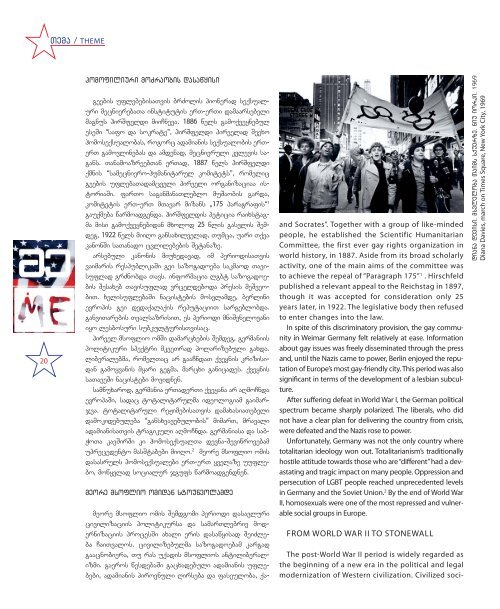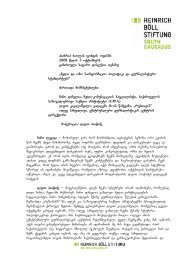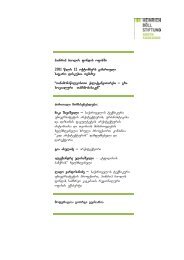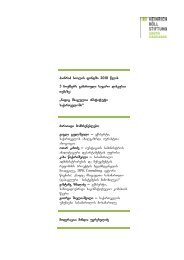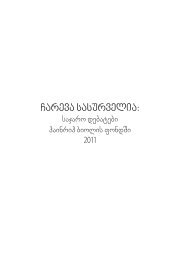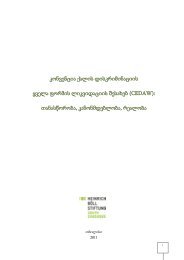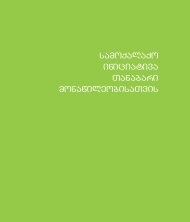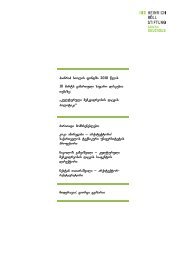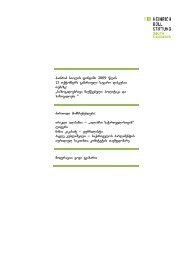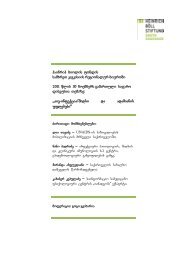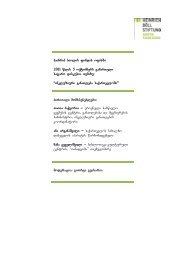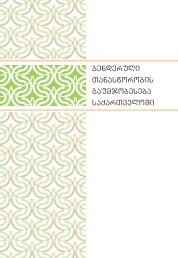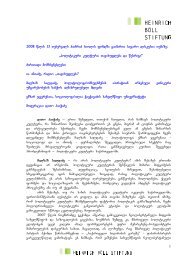HIV infection/AIDS”, posed a terrible threat to humankind. The panic
HIV infection/AIDS”, posed a terrible threat to humankind. The panic
HIV infection/AIDS”, posed a terrible threat to humankind. The panic
Create successful ePaper yourself
Turn your PDF publications into a flip-book with our unique Google optimized e-Paper software.
20<br />
Tema / THEME<br />
homofiliuri moZraobis dasawyisi<br />
geebis uflebebisaTvis brZolis pionerad seqsualuri<br />
mecnierebaTa institutis erT-erTi damaarsebeli<br />
magnus hirSfeldi miiCneva. 1886 wels gamoqveynebul<br />
eseSi “safo da sokrate”, hirSfeldi pirvelad Seexo<br />
homoseqsualobas, rogorc adamianis seqsualobis erTerT<br />
gamovlinebas da amdenad, mecnieruli kvlevis sagans.<br />
TanamoazreebTan erTad, 1887 wels hirSfeldi<br />
qmnis “samecniero-humanitarul komitets”, romelic<br />
geebis uflebaTadamcveli pirveli organizaciaa is<strong>to</strong>riaSi.<br />
farTo saganmanaTleblo muSaobis garda,<br />
komitetis erT-erT mTavar mizans `175 paragrafis~ 1<br />
gauqmeba warmoadgenda. hirSfeldis peticia raixstagma<br />
misi gamoqveynebidan mxolod 25 wlis gasvlis Semdeg,<br />
1922 wels miiRo gansaxilvelad, Tumca, uari Tqva<br />
kanonSi saTanado cvlilebebis Setanaze.<br />
arsebuli kanonis miuxedavad, im periodisaTvis<br />
vaimaris respublikaSi gei sazogadoeba sakmaod Tavisuflad<br />
grZnobda Tavs. informacia lgbt sazogadoebis<br />
Sesaxeb Tavisuflad vrceldeboda presis meSveobiT.<br />
xelisuflebaSi nacistebis mosvlamde, berlini<br />
evropis gei dedaqalaqis reputaciiT sargeblobda.<br />
ganviTarebis TvalsazrisiT, es periodi mniSvnelovani<br />
iyo lesbosuri subkulturisTvisac.<br />
pirvel msoflio omSi damarcxebis Semdeg, germaniis<br />
politikuri speqtri mkveTrad polarizebuli gaxda.<br />
liberalebma, romelTac ar gaaCndaT qveynis krizisidan<br />
gamoyvanis myari gegma, marcxi ganicades. qveynis<br />
saTaveSi nacistebi movidnen.<br />
samwuxarod, germania erTaderTi qveyana ar aRmoCnda<br />
evropaSi, sadac <strong>to</strong>talitarulma ideologiam gaimarjva.<br />
<strong>to</strong>talitaruli reJimebisaTvis damaxasiaTebeli<br />
damokidebuleba “gansxvavebulobis” mimarT, mravali<br />
adamianisaTvis tragikuli aRmoCnda. germaniasa da sab-<br />
WoTa kavSirSi ki homoseqsualTa devna-Seviwrovebam<br />
upreceden<strong>to</strong> masStabebi miiRo. 2 meore msoflio omis<br />
dasasruls homoseqsualebi erT-erT yvelaze uuflebo,<br />
mowyvlad socialur jgufs warmoadgendnen.<br />
meore msoflio omidan s<strong>to</strong>unvolamde<br />
meore msoflio omis Semdgomi periodi dasavluri<br />
civilizaciis politikursa da samarTlebriv modernizaciis<br />
procesSi axali eris dasawyisad SeiZleba<br />
CaiTvalos. civilizebulma sazogadoebam kargad<br />
gaacnobiera, Tu ras uqadis msoflios antiliberalizmi.<br />
gaeros wesdebaSi gacxadebuli adamianis uflebebi,<br />
adamianis pirovnuli Rirseba da faseuloba, qa-<br />
and Socrates”. Together with a group of like-minded<br />
people, he established the Scientific Humanitarian<br />
Committee, the first ever gay rights organization in<br />
world his<strong>to</strong>ry, in 1887. Aside from its broad scholarly<br />
activity, one of the main aims of the committee was<br />
<strong>to</strong> achieve the repeal of “Paragraph 175” 1 . Hirschfeld<br />
published a relevant appeal <strong>to</strong> the Reichstag in 1897,<br />
though it was accepted for consideration only 25<br />
years later, in 1922. <strong>The</strong> legislative body then refused<br />
<strong>to</strong> enter changes in<strong>to</strong> the law.<br />
In spite of this discrimina<strong>to</strong>ry provision, the gay community<br />
in Weimar Germany felt relatively at ease. Information<br />
about gay issues was freely disseminated through the press<br />
and, until the Nazis came <strong>to</strong> power, Berlin enjoyed the reputation<br />
of Europe’s most gay-friendly city. This period was also<br />
signifi cant in terms of the development of a lesbian subculture.<br />
After suff ering defeat in World War I, the German political<br />
spectrum became sharply polarized. <strong>The</strong> liberals, who did<br />
not have a clear plan for delivering the country from crisis,<br />
were defeated and the Nazis rose <strong>to</strong> power.<br />
Unfortunately, Germany was not the only country where<br />
<strong>to</strong>talitarian ideology won out. Totalitarianism’s traditionally<br />
hostile attitude <strong>to</strong>wards those who are “diff erent” had a devastating<br />
and tragic impact on many people. Oppression and<br />
persecution of LGBT people reached unprecedented levels<br />
in Germany and the Soviet Union. 2 By the end of World War<br />
II, homosexuals were one of the most repressed and vulnerable<br />
social groups in Europe.<br />
FROM WORLD WAR II TO STONEWALL<br />
<strong>The</strong> post-World War II period is widely regarded as<br />
the beginning of a new era in the political and legal<br />
modernization of Western civilization. Civilized soci-<br />
diana devisi, msvleloba Taims squerze, niu iorki, 1969<br />
Diana Davies, march on Times Square, New York City, 1969


